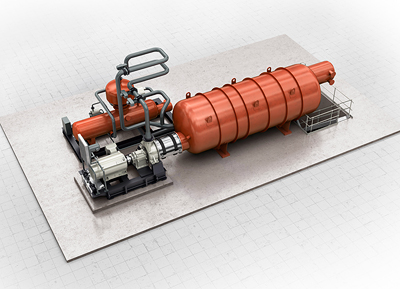Siemens offers new solution for utilization of waste heat using the Organic Rankine Cycle

The picture shows the new Siemens Organic Rankine Cycle (ORC) modul.
The Siemens Organic Rankine Cycle (ORC) module enables owners/operators of industrial plants to generate power from waste heat with temperatures of around 300° Celsius – and this without having to use any additional fuels, meaning without any additional CO2 emissions.
The ORC process uses an organic working medium obtained from the group of sili-cone oils with a substantially lower vaporization enthalpy than water. The vaporized oil is used to drive a steam turbine.
Siemens' initial ORC module employs a model SST-060 steam turbine, which has been installed and enjoyed successful operation in more than 850 applications. The ORC module expands the current product portfolio in this sector.
The ORC modules currently offered by Siemens have a capacity of up to 2 megawatts (MW), but the company is planning to expand the ORC product portfolio to higher capacities over the medium term.
“At present, the waste heat produced in industrial plants often goes unused,” explains Wolfgang Klink, head of the ORC department in the Steam Turbines sector of Siemens Energy. “Using our ORC technology, our customers can now transform this waste heat into electricity and profitably utilize this energy that would have oth-erwise gone to waste.”
The Siemens ORC module stands out thanks to its low investment costs and the low servicing and maintenance effort required. The module can be operated automati-cally, meaning that no additional operating personnel is required.
A further advantage of the module is that the system requires no water, meaning that no water conditioning system is required. The system's simple and compact design, along with its low temperatures and pressures as compared to a conventional steam system, not only enables energy-efficient use of natural resources, but operation of the ORC module makes good economic sense as well.
Contact
Ms. Kerstin Eckert
Energy Sector
Tel: +49 (9131) 18-83481
All latest news from the category: Corporate News
Newest articles

First-of-its-kind study uses remote sensing to monitor plastic debris in rivers and lakes
Remote sensing creates a cost-effective solution to monitoring plastic pollution. A first-of-its-kind study from researchers at the University of Minnesota Twin Cities shows how remote sensing can help monitor and…

Laser-based artificial neuron mimics nerve cell functions at lightning speed
With a processing speed a billion times faster than nature, chip-based laser neuron could help advance AI tasks such as pattern recognition and sequence prediction. Researchers have developed a laser-based…

Optimising the processing of plastic waste
Just one look in the yellow bin reveals a colourful jumble of different types of plastic. However, the purer and more uniform plastic waste is, the easier it is to…



